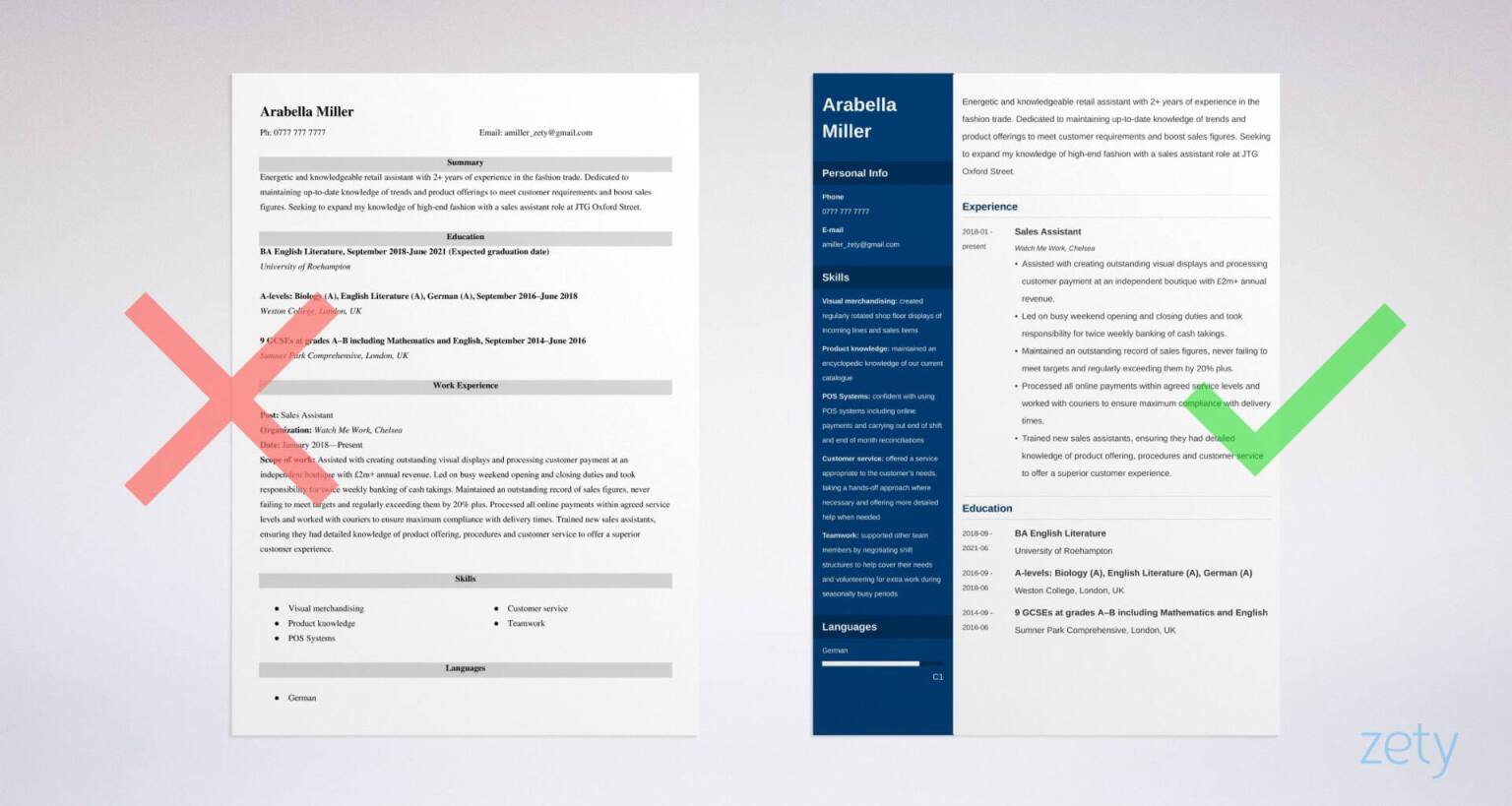CV Education Section: Examples & How to Include It
Create your CV nowIt seems the education section on your CV should be the easiest section of your CV to write, apart from putting your own name at the top.
But there’s more to it than meets the eye. Do you put education or employment first on a CV? How do you write your degree classification on a CV? How do you include A-levels and GCSEs? What do you do if you’re still studying?
This guide will answer all of those questions and more, so regardless of what education you’ve completed, or where you are in your career, we’ve got you covered.
Want to save time and have your CV ready in 5 minutes? Try our CV builder. It’s fast and easy to use. Plus, you’ll get ready-made content to add with one click. See 20+ CV templates and create your CV here.
Sample CV made with our builder—See more CV examples here.
And learn to write the rest of your CV with these guides:
- How to Write Your CV Work Experience Section
- How to Write a Professional CV Summary
- What Should a CV Look Like?
- How to Set Out a Perfect CV Structure
- Best Hobbies and Interests to Put on a CV
- Should You Include References on a CV?
- 20+ Job-Winning CV Tips & Advice
- Skills-Based CV Template & Writing Guide
Now let’s take a look at the most important things you need to consider when writing your CV education section.
1. Do You Put Education or Employment First on a CV?
This is one of the most common questions regarding education on a CV. Most of us know that there’s a standard CV structure to follow, but what comes first? Education or employment?
The answer is, they both can. There’s no hard and fast rule, it just depends on what stage of your career you happen to be in.
If you’ve left school or graduated from university within the last year, you’re not going to have a lot of professional experience. So your education section will be much more important in terms of proving your competence to a prospective employer. So your education can come first. The same applies if you’re still studying.
And if you’re more experienced, your work history becomes the main source of proving your abilities as an employee. So your CV layout changes and your work experience can come before your education.
The further on you are in your career, the less important your education becomes. You still have to include it, it’s just that your work experience will be the first thing the recruiter wants to see.
There will be exceptions to this rule though. A good example is if you’re an experienced candidate writing a career change CV. If you’ve returned to education to obtain a qualification relevant to your new career then it’d make sense to put your education section first.
Read more: What to Include in a CV: Essential CV Sections
2. How to List Education on Your CV
Once you’ve decided whether you’re putting education or employment first you’ll need to know how to format your education on your CV. This is where it gets more complicated. The education section of your CV will look different depending on what level of education you have and how much professional experience you have.
School Leavers
You’ll need to include your A-levels and your GCSEs in your CV education section. Here’s how to write your education in your CV if you’re a school-leaver.
- Use reverse chronological order, that means listing your most recent education first and working backwards. So your A-levels come first, followed by your GCSEs.
- For both, list the name of your school, its location and the dates you attended. Include your expected completion date as the end date if you’re still studying.
But your A-levels and your GCSEs are treated slightly differently, so let’s cover each in turn.
A-Levels on Your CV
If you’re a school-leaver, your A-levels are your most important academic achievement, here’s how to include them in the education section of your CV.
- List each subject you completed. Most people do 3–4 subjects, so this doesn’t take up too much space on your CV.
Should I include grades on my CV?
Unless the job advert says otherwise, it’s not essential that you list your grades. But it is worth highlighting them if they’re very good. If you do want to include your grades simply list your grade for each subject e.g. ‘Mathematics (A)’ or ‘Biology: A.’
GCSEs on Your CV
These are more tricky, in most cases you’ll have studied quite a bit more than 3 subjects. But if you’re trying to limit yourself to a one page CV it’s difficult to list them all. They carry less weight than your A-levels too, so you’ll list them a little differently. Here’s how to do it.
- Instead of listing every subject, you can abbreviate. E.g. ‘10 GCSEs including Maths & English’. It’s important to specify Maths and English as these are considered a bare minimum academic achievement by many employers.
- Again, individual grades aren’t necessary unless the employer specifies otherwise. But if you do include them they can be abbreviated too. E.g. ‘10 GCSEs at grades A–C, including Maths and English’.
Now let’s see how all of this actually comes together on your CV.
Pro Tip: Should I put my GCSEs on my CV is a question many jobseekers ask themselves. If you’re a university student or graduate, the answer is a clear no. If you’re still at school, e.g. studying for your A-levels, then it’s a yes. And if you’re a school-leaver who has just left school within the last 12 months then you should also include them. Otherwise, you can leave them out because your other experience and skills become more relevant.
CV Education Example—School Leaver
Education
A-levels: Maths (A), Physics (A), Chemistry (A). September 2016–June 2028
Loughborough College, London, UK
10 GCSEs at grades A–C, including Maths and English, September 2014–June 2016
Liston Academy, London, UK
University Graduates—How to List a Degree on a CV
If you’re a university graduate then your CV education section will be different again. Here’s the how to put your degree on your CV.
- Use reverse chronological order, so if you’ve got post-graduate qualifications your most recent degree comes first.
- Include the full formal name of your university, the name of your degree, and the dates you undertook it. Include your expected graduation date as the end date if you’re still studying and writing a student CV.
- Honours should only be included if you achieved a first or a 2:1. A third really isn’t going to impress anyone.
- If you’ve graduated within the last 12 months and you’ve got limited work experience then you can list individual modules too, as long as they’re relevant to the job you’re applying for. You could also include relevant extra-curricular activities.
- Mentioning your A-levels and GCSEs isn’t strictly necessary, especially if you’re trying to keep your CV length down. You may want to mention your A-levels if you’re still studying but if you graduated university more than five years ago, then you really shouldn’t include them. It just uses up space on your CV that can be devoted to more relevant information.
Now let’s see how this all looks on your CV.
CV Education Example—University Graduate
Education
BA (Hons), 2:1, History, September 2006–June 2009
University of Exeter, Exeter
- Political Communities in World History, Dissertation on the history and legacy of the post-Thatcher Conservative party in South-West England.
When making a CV in our builder, drag & drop bullet points, skills, and auto-fill the boring stuff. Spell check? Check. Start building your CV here.
When you’re done, Zety’s CV builder will score your CV and tell you exactly how to make it better.
Other Types of Education and Qualifications on Your CV
School and uni aren’t the final word in education of course. You may have obtained other qualifications you need to include on your CV, such as NVQs or professional certifications. So how do you include these on your CV?
For vocational NVQs, BTEC certificates, City & Guilds and other such qualifications that are directly related to obtaining employment then include these in your education section. Follow the same rules for CV education format as you would for a degree. The name of the institution, name of the qualification and the date you achieved it.
For certificates you’ve obtained as a result of workplace training, such as a British Safety Council Health and Safety Course, we recommend you include this as a separate CV section titled ‘Certificates’. It should come last, after your CV skills section, but use the same formatting rules as you would for listing education on your CV.
Here are examples of both.
CV Education Examples—Other Types of Education and Qualifications
Education
Level 2 Diploma in Health and Social Care for England, September 2016–June 2017
Northside College, London
10 GCSEs including maths and English, September 2014-June 2016
Wexford Academy, London
Certificates
- British Safety Council Health and Safety for Directors and Senior Managers, 2015
Pro Tip: If you’ve got any doubts about whether the employer will understand an abbreviation then write it out in full. So if you’ve got a DSyRM it’s better to write it in full as Professional Doctorate in Security Risk Management. Confusing the hiring manager won’t do you any favours.
Key Takeaways
Whatever stage you’re at in your career you need to know how to format education on your CV. Your educational achievements become less important in the hiring process as your career progresses but your CV education section remains essential and has to be correctly written. Here’s how to list your education on your CV:
- Whether education or employment goes first on your CV depends on how experienced you are. In most cases, education goes first if you’re still studying or you finished education within the last year. Otherwise, your work history comes first.
- If you’re a school leaver, include your A-levels and GCSEs. List all of your A-level subjects but summarise your GCSEs, mentioning only maths and English specifically.
- If you’re a university graduate don’t mention honours unless they’re a 2:1 or a first and if you’ve just graduated list individual modules that are relevant to the job.
- Other educational qualifications can be added to your CV too. Add vocational qualifications to your education section and qualifications gained through workplace training to a separate ‘certificates’ section.
Plus, a great cover letter that matches your CV will give you an advantage over other candidates. You can write it in our cover letter builder here. Here's what it may look like:
See more cover letter templates and start writing.
About Zety’s Editorial Process
Our editorial team has thoroughly reviewed this article to ensure it follows Zety’s editorial guidelines. Our dedication lies in sharing our expertise and providing you with actionable career advice that offers you real value. Every year, the quality of our content attracts 40 million readers to our site. But that’s not all – we conduct original research to gain a detailed understanding of the labour market. We take pride in being cited by top universities and leading media outlets in the UK and worldwide.






